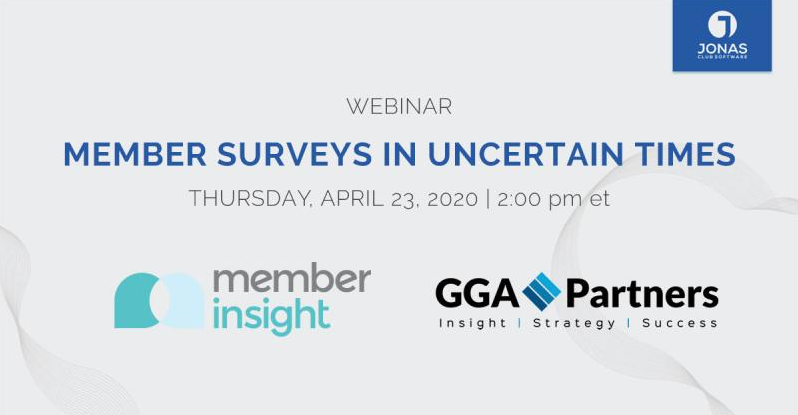Every club manager understands the value of effective conversations, with members, guests, employees, Boards and other stakeholders. Equally as important, is how the club approaches these conversations. What steps should clubs take to obtain the valuable information to hold effective conversations?
Surveys have historically served an essential role in building and maintaining successful club operations. As data analysis methods and technologies advance, surveys are now offering insights derived from data collected that were not previously available. In addition, surveys offer a valuable relationship-building practice with members and employers, the feeling of being heard.
As data-informed decision making has become increasingly vital in club management, surveys continue to serve a crucial role in the member feedback loop as clubs continually collect the right data to inform their operational strategies. While operational and market data create a general understanding, surveys can target specific areas of interest to deliver unique insights that allow clubs to enhance their operations.
Types of Surveys
Surveys at clubs can be utilized for a variety of reasons, but all with the common goal of gathering data that can be used to inform decisions.
Member surveys are common and effective ways of gathering data. These can be in the form of an annual satisfaction survey, strategic surveys, or short pulse surveys aimed at capturing members’ opinions on a smaller range of topics (for example, food and beverage). These surveys usually have the highest levels of participation due to their short length. Overall, what separates member surveys is the customizable availability of the right data to identify opportunities for the club. By asking members their opinions and then acting on that information, members understand what they were asked, and they know the data is being used to keep their best interests at the heart of any changes.
Recent advances in statistical analysis allow clubs to extract even greater insights from satisfaction survey questions. One common error is to focus on those areas of the club that have the lowest satisfaction ratings. Instead, it is important to identify which areas of the club could benefit the most from investment to deliver ROI for members. Using advanced techniques allows clubs to identify touchpoints that can drive increased overall satisfaction by eliminating dissatisfaction and find those targeted risk areas that can negatively influence the member experience.
Another form of club surveys is the employee survey, which is becoming more popular at private clubs, especially considering the labour challenges that many have faced over the last few years. Like member satisfaction surveys, these surveys measure the satisfaction amongst employees regarding performance reviews, tools and resources, training, as well as their relationships with other staff members and club members. These surveys are a valuable way to build morale and satisfaction amongst employees, which contribute to increased retention rates.
Benchmarking Satisfaction
Satisfaction ratings are important to help make decisions. Changes in member preferences, economic conditions, or the industry are often reflected in satisfaction ratings and can be tracked and highlighted if the survey is repeated annually. Maintaining benchmarks as accurately and comprehensively as possible, but also club and member profiles to provide segmented understanding, becomes important so you are aware of whether changes at your club are reflective across the industry, or which areas of club operations should be focused on the most.
During COVID-19, it was common for access to tee ratings to decrease and create strain on the golf course due to demand that exceeded previous years. Demand levels have begun to fall slightly in 2022 but continue to be far higher than before the pandemic began. Furthermore, understanding industry survey trends and best practices falls into favour when conducting surveys. For example, food and beverage operations are typically the most scrutinized area of club operations. However, a lower satisfaction rating for dining than the satisfaction rating for the golf course fairways does not necessarily mean that your club is struggling in that area. Accurately benchmarking this area of operations is important for club managers and their Boards to understand whether their ratings are unique or concerning.
Planning for the Future
Surveys are a useful tool for future planning at the club, ranging from interest in new amenities to changes to the club’s future vision. Asking members about their interest in potential capital projects helps prioritize these projects. Ensuring that members are asked about their tolerance to pay for these projects is an important consideration as this knowledge will help significantly in the planning/budgeting phase.
The club’s vision is another important aspect in helping the Board and management with decision-making and guiding the club into the future. Asking appropriate questions on members’ opinions of their future vision of their club offers them the opportunity to help guide the club’s positioning, based on their perceptions of the ideal private club experience.

Five Tips for Developing an Effective Survey
- Avoid including leading questions or those that may lead to confirmation bias as members want to know that their opinions matter, and that decisions haven’t already been made about changes to the club.
- Regularly conduct surveys, annually, if possible, to accurately track trends in satisfaction levels and member preferences as part of a larger data strategy.
- To prevent higher drop-off rates and lower response rates, keep the survey brief.
- Consider offering rewards or incentives for completing the survey and send gentle reminders; this typically increases the response rate, reduces costs, and is better for the environment.
- Ensure you ask questions to effectively segment the data to identify member differences; demographic questions are important but layered techniques, such as family life cycle, yield deeper insights.
As data collection methods and technologies continue to evolve, clubs that engage their members, employees and relevant stakeholders will gain a strategic advantage. Holding the conversations that matter and subsequently acting on what is needed will contribute to keeping your club connected, competitive and successful.
This article was authored by Michael Gregory, Partner for the Club Management Association of Canada’s Club Manager Quarterly Magazine.









